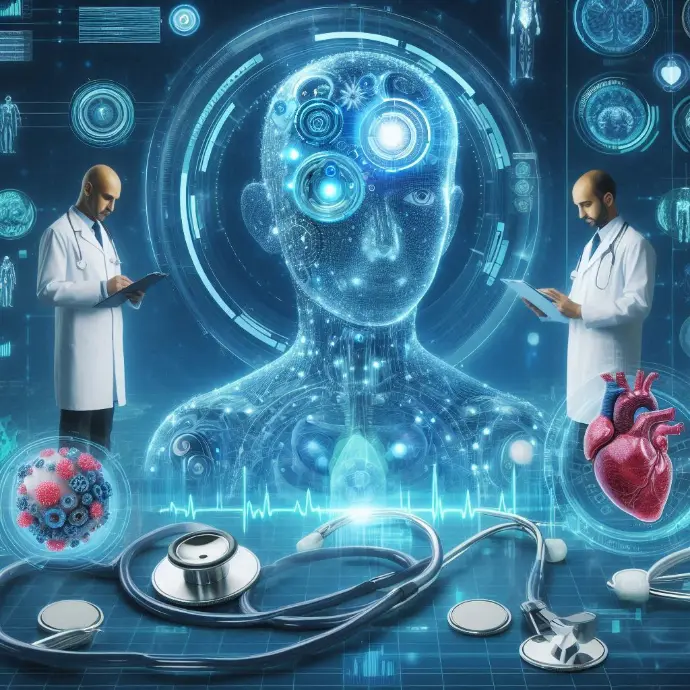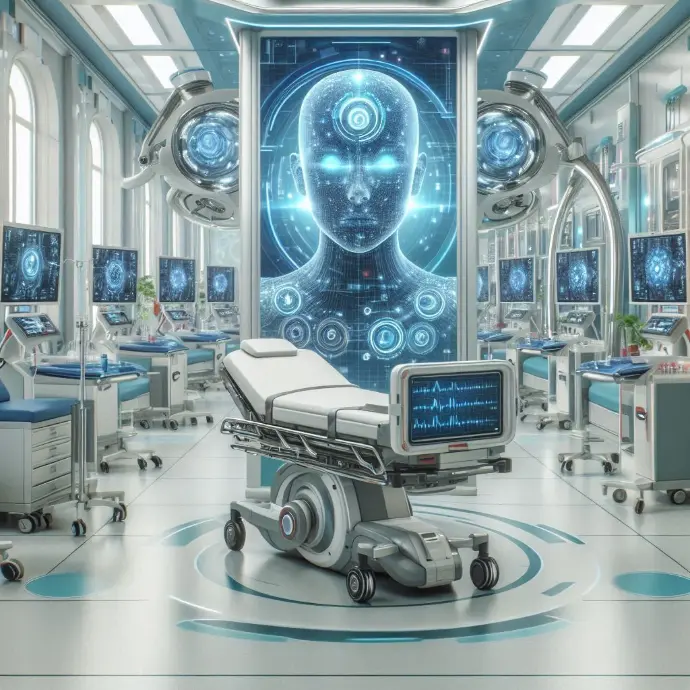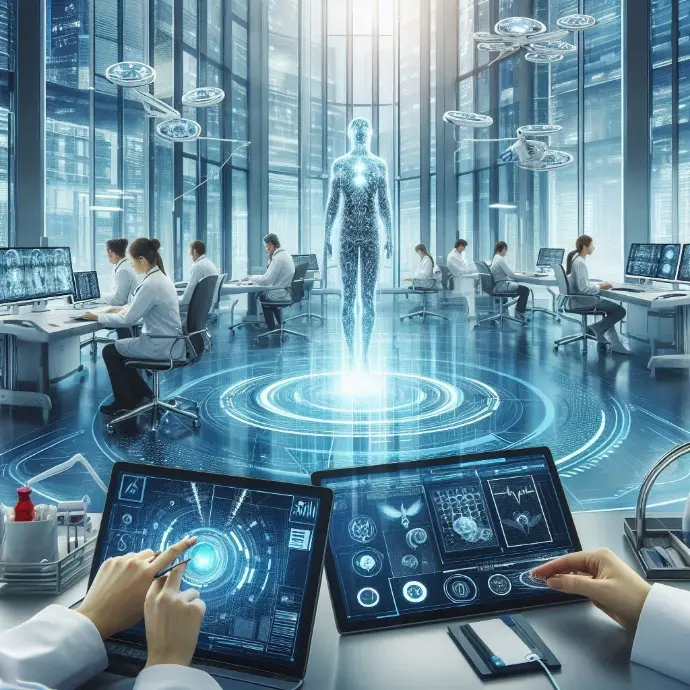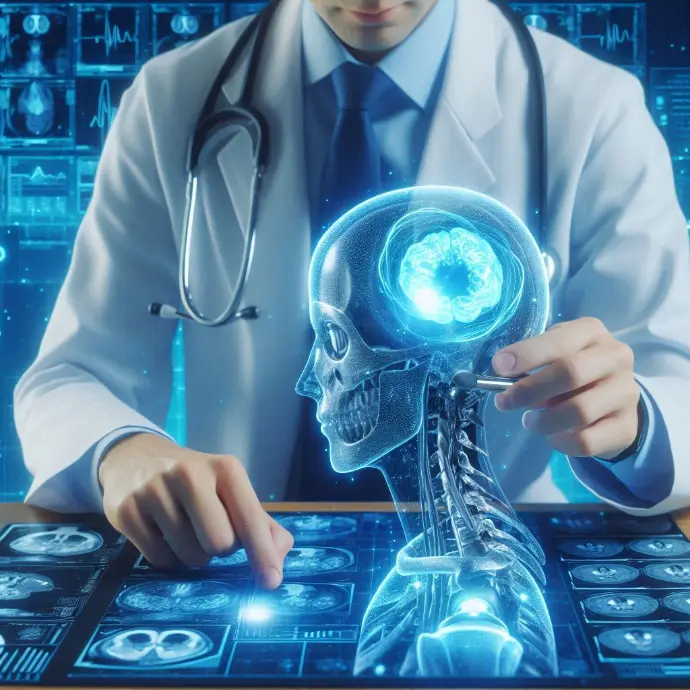Diagnostics at the speed of light:
Artificial Intelligence revolutionizing medicine
Here you will find a universe of technological possibilities that defy the limits of the imagination. In our main article "Diagnostics at the Speed of Light: Artificial Intelligence Revolutionizing Medicine," we explore the impact of artificial intelligence in the field of medicine, opening the door to more accurate and faster diagnoses. Get ready to enter a world where technology and medicine converge to transform the future of healthcare!
Artificial Intelligence in Medical Diagnostics
We will explore how AI is transforming the medical diagnostic landscape, as well as the challenges and limitations it still faces in this field.

Introduction to Artificial Intelligence in Medicine
AI in medicine has become a field of great interest due to its potential to improve efficiency in diagnostic and treatment processes. AI algorithms can analyze large volumes of medical data, such as MRI images, CT scans, genetic data, and clinical records, to identify patterns and generate accurate diagnoses. This has enabled healthcare professionals to make more informed decisions and provide more personalized treatment to patients.
Furthermore, AI has also proven useful in the early identification of diseases, which can lead to more favorable prognoses and timely medical intervention. Likewise, AI's ability to process large amounts of data in real time has paved the way for the development of clinical decision support systems, which can be especially valuable in resource-limited healthcare settings. AI in medicine has paved the way for more precise, personalized, and timely medical care, leading to significantly improved health outcomes for patients.

Impact of Artificial Intelligence on Medical Diagnosis
The impact of AI on medical diagnosis has been profound and multifaceted. First, AI's ability to analyze medical images has led to significant advances in the early detection of diseases such as cancer, heart disease, and neurological conditions. AI algorithms can identify subtle abnormalities that might otherwise be missed by human scrutiny, allowing for more accurate diagnosis and early intervention. Furthermore, AI has proven invaluable in interpreting genetic data, leading to advances in identifying genetic predispositions to disease and personalizing treatment regimens. This ability of AI to analyze and understand the complexity of genetic information has paved the way for more predictive and preventative medicine. In the field of telemedicine, AI has enabled the development of remote diagnostic systems that can bring specialist expertise to remote or underserved regions, thereby expanding access to specialized medical care. AI has had a significant impact on medical diagnosis by improving the accuracy, speed, and accessibility of diagnoses, leading to an overall improvement in health outcomes for patients.
Despite significant advances, AI in medical diagnosis also faces challenges and limitations. One of the key challenges is the need to ensure the transparency and interpretability of AI algorithms, especially in critical settings such as healthcare. Understanding how and why an algorithm arrives at a given diagnosis is crucial to the confidence of healthcare professionals and patients in its application.
Furthermore, the quality of the data used to train AI algorithms is critical to their accuracy and reliability. The availability of large, high-quality data sets is essential, but in many cases, this data may be limited or biased, which can affect the effectiveness of the algorithms in diverse settings.
Another major challenge is the effective integration of AI into existing clinical workflows. AI systems must be able to interact seamlessly with electronic medical record systems and other health information systems, which may require significant integration efforts and training of medical staff. While AI has demonstrated tremendous potential to transform medical diagnosis, it is crucial to address these challenges and limitations to ensure its implementation is safe, reliable, and ethical.
Artificial Intelligence (AI) is revolutionizing medicine with its current and future applications in the diagnosis and treatment of diseases. Currently, AI is used to analyze large volumes of medical data, such as MRIs, CT scans, and X-rays, to identify patterns and abnormalities that might otherwise go unnoticed by physicians. This ability of AI to process and analyze large-scale data has enabled significant advances in the early detection of diseases such as cancer, heart disease, and neurological disorders.
In addition to its current applications, AI promises an exciting future in medicine. It is expected that AI will be able to more accurately predict disease progression, personalize medical treatments based on each patient's specific needs, and facilitate the identification of new drugs and more effective therapies. Furthermore, AI-assisted surgery is on the horizon, which could reduce risks and improve the outcomes of surgical procedures.
AI in medicine is opening up new possibilities for early detection, accurate diagnosis, and personalized treatment of diseases. As technology continues to evolve, we're likely to see even more significant advances that will transform the way medicine is practiced.
How Does Artificial Intelligence Work in Medical Diagnoses?

Algorithms and Machine Learning
Artificial Intelligence (AI) in medical diagnostics relies on sophisticated algorithms and machine learning techniques to analyze large amounts of patient data and generate useful patterns for disease detection. These algorithms are capable of identifying correlations and trends that a physician might miss, allowing for earlier and more accurate detection of medical conditions.
Machine learning is fundamental to this process, as it allows algorithms to improve their performance as they gain access to more data, making them increasingly accurate in identifying pathologies. The use of algorithms and machine learning in medicine has revolutionized the way diseases are diagnosed, allowing for faster and more accurate analysis, leading to more effective and timely medical care for patients.
One of the most impactful advances in artificial intelligence in medicine is its ability to process medical images, such as CT scans, MRIs, and X-rays, to identify abnormalities and pathologies. AI algorithms can analyze these images with astonishing accuracy, allowing them to detect even the smallest or most difficult-to-see lesions.
AI-powered medical image processing not only speeds up the diagnostic process but also reduces the possibility of human error, as the algorithms are able to consistently and objectively detect patterns and abnormalities. Thanks to this technology, more accurate and faster diagnoses can be obtained, which can be crucial in the treatment of serious illnesses or in emergency situations.
Artificial Intelligence is capable of analyzing large amounts of clinical data, such as medical histories, laboratory test results, and disease records, to identify patterns and trends that could be indicative of certain medical conditions. This allows healthcare professionals to make more informed and accurate decisions about patient diagnosis and treatment.
AI-powered clinical data interpretation can also help predict disease progression, identify risk factors, and personalize treatment plans based on each patient's individual characteristics. Artificial Intelligence is revolutionizing medicine by enabling deeper and more accurate interpretation of clinical data, leading to more accurate diagnoses and more effective treatment for patients.
The validation and accuracy of medical diagnoses are fundamental aspects of the development and implementation of artificial intelligence in medicine. Validation refers to verifying that AI algorithms and models produce accurate and reliable results, which involves comparing them with diagnoses made by human experts and assessing the sensitivity and specificity of the tests.
In the context of artificial intelligence applied to medical diagnoses, accuracy refers to the algorithms' ability to accurately identify and classify diseases or conditions based on data provided, such as medical images, laboratory test results, patient symptoms, and other information. Accuracy is crucial to avoid misdiagnoses that could put patients' health at risk.
To ensure the validity and accuracy of AI-assisted diagnoses, extensive testing is conducted with diverse and extensive datasets, cross-validation techniques are applied, and results are compared with established medical standards. Furthermore, collaboration between healthcare professionals and AI experts is essential to ensure that algorithms are aligned with clinical needs and result in significant improvements in the accuracy and effectiveness of medical diagnoses.
Benefits of Artificial Intelligence in Medical Diagnosis

Accurate and Early Diagnoses
Artificial Intelligence (AI) has revolutionized the field of medicine by enabling more accurate and earlier diagnoses. By analyzing large volumes of data, AI can identify patterns and correlations that healthcare professionals might miss. This early detection capability is critical in the treatment of diseases, as it allows for early intervention, increasing patients' chances of success and survival.
By using machine learning algorithms, AI can analyze medical images, such as CT scans or MRIs, to detect abnormalities or signs of disease. This ability to identify subtle patterns that the human eye might miss allows for more precise and accurate diagnoses, providing the opportunity to initiate treatment earlier. In a study conducted by Stanford University, an AI algorithm developed to detect skin cancer was shown to surpass the accuracy of a group of 21 board-certified dermatologists. This result exemplifies the potential of AI to improve the accuracy of medical diagnoses, which undoubtedly has a positive impact on patient care and prognosis.
The implementation of Artificial Intelligence in medical diagnosis not only improves accuracy but also optimizes time and resources in healthcare facilities. AI algorithms can process large amounts of data in record time, streamlining the analysis and diagnosis process. This means that physicians can access detailed information and specialized analysis more quickly, which in turn enables agile and informed decision-making.
Furthermore, AI can help prioritize cases, identifying those that require immediate attention, which is especially relevant in hospital settings with high demand. This approach based on prioritizing critical cases facilitates more efficient allocation of medical resources, ensuring timely care for the patients who need it most.
An example of this is the use of AI algorithms for the interpretation of radiology studies, where the technology can identify and prioritize the most urgent cases, allowing radiologists to focus on the most complex diagnoses and interact with other healthcare professionals to define treatment plans.
Artificial Intelligence not only impacts diagnosis but also opens the door to the personalization of medical treatments. By analyzing genetic data, medical histories, and other relevant factors, AI can help identify specific therapies tailored to each patient's individual characteristics. This personalization capability promises to improve treatment effectiveness, reduce side effects, and optimize long-term outcomes.
Furthermore, AI can continuously monitor patient progress, constantly analyzing data such as vital signs, glucose levels, or treatment responses, allowing for dynamic and personalized therapy adjustments. This real-time adaptation capability can make a difference in the management of chronic diseases or in the recovery of postoperative patients.
A prominent example is the use of AI algorithms in oncology, which seeks to identify the most effective treatment for each type of cancer, taking into account the genetic characteristics of the tumor and the patient. This personalized approach promises to revolutionize the way cancer treatment is approached, offering greater chances of success and survival for patients.
The implementation of artificial intelligence in the medical field has proven crucial in reducing medical errors. The ability of machine learning algorithms to analyze large amounts of data and detect anomalous patterns has led to a significant decrease in misdiagnoses and misinterpretations of clinical tests. According to a study published in the Journal of the American Medical Association, it is estimated that at least 10% of medical diagnoses are incorrect. Artificial intelligence, by improving the accuracy and consistency of interpreting medical images and laboratory tests, has helped mitigate this problem, providing invaluable support to healthcare professionals.
Furthermore, artificial intelligence has proven effective in the early identification of diseases, helping to prevent serious complications by enabling early medical interventions. For example, by analyzing data from high-risk patients, AI algorithms can identify patterns that suggest the early presence of heart disease, cancer, or other conditions, allowing physicians to take preventive measures before the condition worsens. This not only benefits patients by improving their health outcomes, but also reduces the burden on the healthcare system by reducing the need for costly and lengthy treatments.
The incorporation of artificial intelligence into medical diagnostics has been instrumental in reducing errors in the interpretation of clinical data, improving early disease detection, and ultimately providing more accurate and effective care for patients.
Challenges and Ethical Considerations
The implementation of artificial intelligence in the medical field has sparked a broad debate about the privacy and security of medical data. The collection and analysis of vast amounts of patient information raises concerns about who has access to this data and how it is used. It is critical to establish strict protocols to ensure that sensitive information is securely protected and used only for legitimate medical purposes. Data encryption and restricted access are crucial measures to address these concerns and maintain trust in the use of artificial intelligence in medical diagnoses.
Furthermore, human accountability and oversight are critical aspects to consider when integrating artificial intelligence into medical diagnoses. Although AI can deliver rapid and accurate analysis, it is essential that healthcare professionals assume final responsibility for any diagnosis or clinical decision. Human oversight ensures that additional factors, such as patient context, medical history, and other elements that may influence the diagnosis, are taken into account. The combination of human expertise with the analytical power of artificial intelligence is critical to providing comprehensive, high-quality medical care.
In terms of equity and access to technology, it is crucial to consider how the implementation of artificial intelligence in medical diagnostics may affect different population groups. Ensuring that the technology is available and accessible to all communities, regardless of geographic location or socioeconomic status, is a significant challenge. Equity in access to medical technology is essential to prevent the widening of existing healthcare gaps. The careful implementation of artificial intelligence must take these considerations into account to ensure its benefits are equitably available to all patients.
Regulations and standards surrounding AI-assisted diagnostics represent a crucial challenge in the field of medicine. As AI is increasingly integrated into medical diagnostic processes, it is essential to establish regulatory frameworks that ensure the safety, accuracy, and ethics of these technologies.
In many countries, regulatory bodies are working to create specific guidelines addressing the use of AI in healthcare. These regulations range from the approval of AI algorithms for diagnosis to the protection of patient data privacy and confidentiality. It is critical that these regulations remain up-to-date and flexible enough to adapt to the rapid evolution of technology.
Furthermore, collaboration between healthcare professionals, AI developers, and regulatory bodies is essential to ensure that regulations accurately reflect the needs and challenges of the field of AI-assisted medical diagnostics. Transparency, accountability, and ongoing evaluation are fundamental pillars in building a robust regulatory framework that fosters innovation while protecting patient safety and well-being.

The Future of Artificial Intelligence in Medicine
The integration of artificial intelligence (AI) in the field of medicine has led to significant technological advances, enabling the development of new applications that revolutionize the way medical diagnoses are made.
AI has proven to be an invaluable tool in the interpretation of medical images, such as MRIs, CT scans, and X-rays. Thanks to deep learning algorithms, AI can identify patterns and anomalies more accurately and quickly than a human, streamlining the diagnostic process and enabling more timely patient care.
Furthermore, AI has been instrumental in the development of disease prediction applications, analyzing large volumes of medical data to identify risk factors and early signs of disease, resulting in more effective preventive diagnoses.
The integration of artificial intelligence into medical practice has been a gradual but significant process. AI systems do not replace the work of healthcare professionals, but rather complement their expertise, providing support tools for more informed clinical decision-making.
Doctors and specialists use AI as an ally in interpreting complex data, personalizing treatments, and predicting outcomes, which has improved the accuracy and effectiveness of medical diagnoses and treatments.
AI has also enabled the optimization of workflows in medical settings, streamlining administrative processes such as medical record management and appointment scheduling, freeing up time for medical staff to focus on direct patient care.
It is important to note that the integration of AI into medical practice has generated relevant ethical and legal discussions related to data privacy, accountability in clinical decision-making, and equity in access to these technologies.
The expected developments in the field of medical diagnostics, thanks to artificial intelligence, point to greater accuracy and speed in disease detection, which will contribute to more effective treatment and improved clinical outcomes.
AI is expected to continue evolving to enable early detection of diseases, even before symptoms appear, revolutionizing the prevention and treatment of chronic diseases.
Furthermore, AI has the potential to improve the interpretation of laboratory tests, such as blood, urine, and tissue analysis, allowing for more accurate and personalized diagnoses tailored to each patient's individual characteristics.
Artificial intelligence is emerging as a fundamental tool in the medicine of the future, offering more accurate diagnoses, personalized treatments, and more efficient medical care, promising to revolutionize the way health challenges are addressed.

Conclusions
Artificial Intelligence (AI) is having a transformative impact on medicine, revolutionizing the way medical diagnoses are made. Thanks to AI, the accuracy and speed of disease detection have improved, leading to a significant shift in healthcare.AI's ability to analyze large volumes of medical data in record time has made it possible to identify patterns and correlations that were previously difficult to detect. This has led to earlier and more accurate diagnosis of diseases, which in turn has improved survival rates and quality of life for patients.Furthermore, AI has enabled the development of more sophisticated diagnostic tools, such as medical image interpretation, genetic pattern analysis, and prediction of disease progression. All of this has contributed to a radical shift in the way healthcare professionals approach diagnosis and treatment.
While AI has proven incredibly useful in the field of medicine, its use raises important ethical and practical considerations. It is crucial to ensure that AI-based clinical decisions are supported by solid evidence and that human oversight is maintained at all times.
Furthermore, it is essential to address issues related to the privacy and security of medical data, as well as to ensure that the use of AI in medical diagnoses does not create disparities in access to healthcare.
The ethical and effective implementation of AI in medicine requires collaboration between healthcare professionals, data scientists, regulators, and society as a whole to ensure that the benefits of AI are fully leveraged without neglecting ethical considerations and equity in healthcare.
As AI continues to evolve, its role in medical diagnosis is expected to continue to grow. A future is envisioned in which AI will not only aid in the early detection of diseases but will also contribute to the personalization of treatments based on each patient's genetic information and unique medical history.
Furthermore, AI is expected to enable the development of remote diagnostic systems, thereby expanding access to healthcare in rural areas or areas with a shortage of healthcare professionals. This could have a significant impact on disease prevention and treatment worldwide.
Artificial Intelligence is playing a crucial role in transforming medical diagnostics, and its potential to improve accuracy, efficiency, and equity in healthcare is truly exciting.

 IHRO NEWS
IHRO NEWS